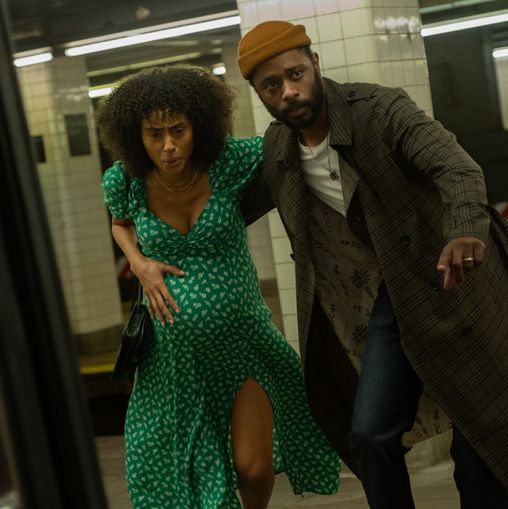
Victor LaValle’s 2017 novel The Changeling artfully weaves horror and fantasy to tell a captivating and gruesome story about parenthood. It’s hard to even categorize the original work into a singular genre, making LaKeith Stanfield a fitting lead to guide us through the television adaptation, as the actor is well versed in taking roles that don’t easily fit into a box.
The most challenging part of the novel is keeping up with the many threads presented throughout the story — there’s the European folklore influence, the fantasy element, the commentary on race, and the exploration of modern fatherhood, to name a few — and the season premiere follows in the same footsteps. But that’s okay; what made LaValle’s story compelling was anticipating how everything would fall together, taking the reader on an epic, genre-bending odyssey much like the one our main character embarks on.
This episode primarily serves as a meet-cute for both Apollo and his future wife and Apollo’s parents, with each love story paralleling the other in separate timelines. Stanfield plays Apollo Kagwa, a rare-book dealer in 2010’s New York who meets librarian Emma Valentine, played by Clark Backo, at a library in Queens. Apollo is immediately smitten with Emma, and despite the feeling being somewhat mutual, Emma rejects Apollo’s multiple advances because she’s preparing to go on a sojourn to Brazil for an undecided amount of time.
Back in the New York of 1968, Apollo’s mother, an Ugandan immigrant named Lillian Kagwa, is working as a secretary for a shady modeling agency and encounters Apollo’s dad, a white New Yorker named Brian West, when he busts the agency for racketeering. Though Lillian loses her job because of him and has already made it known that she “doesn’t date white guys,” Brian persistently wears her down for nine whole years until she agrees to a date to see Rocky. For some (me), this would be considered harassment, but others may find it to be romantic, and this same tenacity exists in the child Brian and Lillian created together. They conceive Apollo and name him after the infamous Rocky character because, as Brian said, it would be “weird” to name a Black kid Rocky.
Out of all the genres enlisted in LaValle’s storytelling, rom-com is definitely not one of them, and the rose-colored haze of love and romance quickly dissipates between Brian and Lillian. We’re not given many details, but Brian abandons Lillian and the baby after four years, leaving young Apollo to fill in the blanks as to why his father couldn’t stick around. Apollo begins to have recurring dreams that follow him into adulthood, featuring a blue-hued demonic version of Brian appearing at the door, billowing blue plumes of smoke from his mouth while emitting monstrous growls. Then, one day, when Apollo is in his adolescence, he receives a box of his father’s belongings, the same box shown in Brian and Lillian’s timeline labeled “Improbabilia.” The moment is similar to his recurring dream: Apollo is preparing for a shower when he hears a knock on the door, usually to see the blue-monster version of his dad, but this time only the old box is on the other side.
Inside the box, Apollo finds a book of children’s fairy tales — not the kind with princesses and happy endings, but the OG European fairy tales filled with gore and tortuous fables, thus handing us a major bread crumb. The book is called To the Waters and the Wild, which is a line from W.B. Yeats’s poem “The Stolen Child,” and Apollo flips to a page with a huge, cherub-looking baby playing the fiddle upon a bed of mushrooms while chaos ensues on the ground with what looks like trolls and miniature-size people. The caption reads: “A baby is a dream made real. But dreams are the fairies favorite meal.”
It’s important to note here that Yeats’s poem heavily references European folklore, specifically the concept of a changeling, which is a deformed, humanlike creature that fairies/trolls/elves/insert whatever-underworld-being use as a decoy when stealing human babies. We don’t quite know how this will unfold, but we’re being sent in a very clear direction to connect the dots as the show is obviously called The Changeling. But let’s get back to the episode. The narrator (voiced by LaValle himself) states that Apollo always loved reading, but something about the book he found in the box felt “different.” It’s a seemingly pivotal moment propelling him into his future of turning books into a career as a rare bookseller.
As his father did at dinner before seeing Rocky with Lillian, once Apollo finally gets a date with Emma, he quickly laments about how badly he wants children and verbally fantasizes about the kids they could have together. He says it’s been his lifelong dream to be a father in the same way some people dream of being an astronaut or a scientist. Emma yanks him down from the clouds and admits the real reason she initially rejected him. Apollo doesn’t consider breaking it off as an option; he emphatically yells, “I’m the god Apollo, and I command you to stay!” They stay together, with Apollo dropping Emma off for her flight to São Paulo and picking her back up a year later.
Emma also had a life-changing moment in her adolescence that led her to her South American trip. As an orphan raised by her older sister, Emma spent a lot of time at the library as a child. She got her hands on a copy of the movie Quilombo, which she described as “the only movie in the entire library that had Black people on the cover,” and was inspired to visit Brazil. The movie dramatizes the history of a city founded by enslaved Africans who rebelled in the 17th century, depicting the violent uprisings of Africans against the Portuguese. Brazil has the highest number of Black descendants of the slave trade, making its spiritual ties to Africa robust and powerful. Most notably, the African diasporic religion Candomblé was created in Brazil and is similar to Black syncretic religions like Haitian Voodou or Black Southern American hoodoo — which are all commonly used as a jumping point for magical storytelling in Black film, TV, and literature.
When Emma travels to Brazil, she’s told by locals to avoid going to a lagoon called Lagoa de Abaeté, but she disregards their advice and explores there anyway. She encounters a terrifying old Black lady, who looks almost like a scary version of a Candomblé medicine woman, who demands that Emma think of three wishes before she ties a red string around Emma’s wrist. Emma closes her eyes, conjuring her wishes, as the woman tells her to be careful about what she wishes for before scaring Emma off with her cackles, yelling in Portuguese that the string cannot be cut off.
Upon her return to New York, Emma tells Apollo about her encounter at the lagoon and shows him the red string on her wrist, explaining that when it falls off, her three wishes will come true. Her face twists disturbingly as she repeats the woman’s words: “Do not cut it. Não corta-la.” Apollo breaks the moment with a laugh, pulls out his pocket knife, cuts the string, and declares: “I am the god Apollo. Emma, with me, all three of your wishes will come true.” Time passes with glimpses of Apollo and Emma’s wedding, and the moment Emma informs Apollo of her pregnancy using custom-made fortune cookies, which leads into a scene of Apollo adding his copy of To the Waters and the Wild to a bookshelf in the nursery.
Apollo and a very pregnant Emma meet with Emma’s friend Michelle for dinner one night toward the end of Emma’s third trimester. After Emma excuses herself to the bathroom, Michelle, who has had a few drinks, immediately tells Apollo that there’s a naked picture of Emma in an art gallery in Norway. She gets sidetracked by the topic of Emma’s red string, which Apollo has kept since cutting it off. Inebriated, Michelle tells Apollo two of Emma’s wishes, revealing that she wished for a good husband and healthy child. Before divulging the third wish, she expands on this Norwegian photographer, explaining that during an expedition together, Emma took the photographer’s camera while he was in the bathroom. Using the self-timer, Emma stripped nude and captured her own image, an image that made its way to a Norwegian gallery.
Michelle tells Apollo that Emma was looking into the lens “like a fucking sorceress” in a frightening way. She goes on to say she’s trying to tell Apollo the third wish without breaking Emma’s trust, but they’re interrupted when Emma unexpectedly goes into labor. Since they planned on having a natural home birth, instead of heading to the hospital in an ambulance, they jump on the subway to go home. But it’s too late — with the help of a dance group performing on the subway at the most inopportune time, Emma delivers a baby right then and there, and they name him Brian.
Emma and Apollo’s love story is quickly shattered, just like his parents — after the magical birth of Brian, we’re given a peek at what’s to come with flashes of Apollo being tortured and Emma’s primal screams. LaValle narrates over the footage, saying, “Tell me your journey, each of you. Tell me your life’s voyage and I will tell you who you are,” the exact words that began the episode, ushering us into what’s primed to be a twisted adult fairy tale.
Apollo’s Bread Crumbs
• Although there’s so much to keep track of, and we’re only on episode one, Stanfield’s and Backo’s acting pulls it together with their ability to exude complex emotions with an air of “something sinister is going on beneath the surface.” The same goes for Melina Matsoukas’s directing, which features a gothic style.
• The Changeling is filled with references to mythology, literature, and media. Lyrics to Stevie Wonder’s “Superstition” are displayed on the subway wall, a co-worker gives Lillian a copy of H.G. Wells’s The War of the Worlds to give to young Apollo, and Apollo finds a rare letter from occultist Aleister Crowley (he’s huge in the world of metaphysics) in one of the books he acquired from an estate sale. All of these things allude to the fantasy element of the show; however, it’s giving me a bit of whiplash trying to keep up, and I’m interested to see how it all ties together.
• Am I the only one who can’t help but think of the 2000s Kabbalah craze in Hollywood? I wonder if this was intentional or coincidental, but I love it either way.




